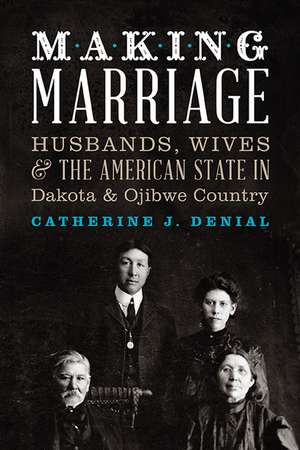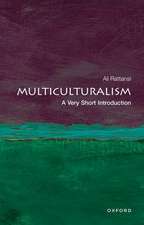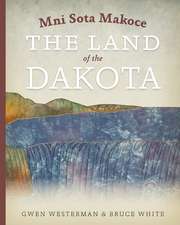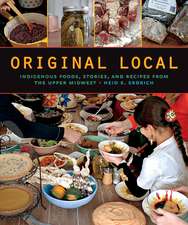Making Marriage: Husbands, Wives, and the American State in Dakota and Ojibwe Country
Autor Catherine J. Denialen Limba Engleză Paperback – 14 aug 2013
The debate over the meaning of marriage in the United States and specifically in Minnesota is not a recent development. From 1820 to 1845, when the first significant numbers of Americans arrived in the region now called Minnesota, they carried the belief that good government and an orderly household went hand in hand. The territorial, state, and federal governments of the United States were built upon a particular vision of civic responsibility: that men, as heads of households, enter civic life on behalf of their dependents—wives, children, servants, and slaves. These dependents were deemed unfit to make personal decisions or to involve themselves in business and government—and they owed labor and obedience to their husbands, fathers, and masters.
These ideas clashed forcibly with the conceptions of kinship and social order that existed among the Upper Midwest's long-established Dakota, Ojibwe, and mixed-heritage communities. In resisting the new gender and familial roles advocated by military personnel, Indian agents, and missionaries, the region’s inhabitants frustrated American attempts to transform Indian country into a state. Indeed, many Americans were forced to compromise their own beliefs so that they could put down roots.
Through the stories of married—and divorcing—men and women in the region, Catherine J. Denial traces the uneven fortunes of American expansion in the early nineteenth century and the nation-shaping power of marital acts.
Catherine J. Denial is associate professor of history at Knox College in Galesburg, Illinois. She specializes in American Indian history and the history of marriage in the United States.
These ideas clashed forcibly with the conceptions of kinship and social order that existed among the Upper Midwest's long-established Dakota, Ojibwe, and mixed-heritage communities. In resisting the new gender and familial roles advocated by military personnel, Indian agents, and missionaries, the region’s inhabitants frustrated American attempts to transform Indian country into a state. Indeed, many Americans were forced to compromise their own beliefs so that they could put down roots.
Through the stories of married—and divorcing—men and women in the region, Catherine J. Denial traces the uneven fortunes of American expansion in the early nineteenth century and the nation-shaping power of marital acts.
Catherine J. Denial is associate professor of history at Knox College in Galesburg, Illinois. She specializes in American Indian history and the history of marriage in the United States.
Preț: 108.85 lei
Nou
Puncte Express: 163
Preț estimativ în valută:
20.83€ • 21.52$ • 17.33£
20.83€ • 21.52$ • 17.33£
Carte disponibilă
Livrare economică 26 februarie-12 martie
Preluare comenzi: 021 569.72.76
Specificații
ISBN-13: 9780873519069
ISBN-10: 087351906X
Pagini: 208
Ilustrații: 6 black and white illustrations
Dimensiuni: 152 x 229 x 18 mm
Greutate: 0.31 kg
Ediția:1
Editura: Minnesota Historical Society Press
Colecția Minnesota Historical Society Press
ISBN-10: 087351906X
Pagini: 208
Ilustrații: 6 black and white illustrations
Dimensiuni: 152 x 229 x 18 mm
Greutate: 0.31 kg
Ediția:1
Editura: Minnesota Historical Society Press
Colecția Minnesota Historical Society Press
Descriere
Dakota, Ojibwe, and mixed-race communities resisted the early American version of marriage, in which women give up all rights to civic life.













